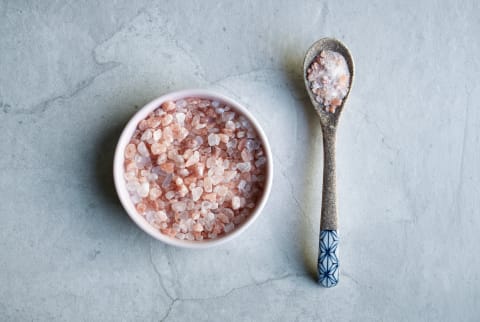Advertisement
I'm A Biochemist & This Is Exactly How Much Salt You Should *Really* Be Eating


Robb Wolf wants to talk about salt—specifically, how we're not getting enough of it. According to the New York Times bestselling author and former biochemist, the anti-sodium campaign has people skipping the salt shaker, which can do more harm than good for your well-being. Sodium is a critical mineral for the human body1, essential for a number of functions like electrolyte balance, nutrient absorption, and kidney function. And yet, our relationship with salt can be apprehensive, at best.
Well, according to Wolf on the mindbodygreen podcast: "It's far more dangerous to be too low of sodium than too high." Allow him to explain.
Why sodium isn't the villain.
It all has to do with the sodium-potassium relationship: According to existing literature, too little potassium in your diet and too much sodium can raise your blood pressure2 (which is why those with high blood pressure, or hypertension, are often advised to partake in low-sodium diets).
But according to Wolf, it's important to keep the sodium-potassium ratio in balance, not cut sodium out of the equation altogether. "If you get your sodium-potassium ratio off just a little bit, it can be a really gnarly downward spiral," he says.
For example, if you lose sodium, says Wolf, your body will excrete potassium to try to meet the new, lower balance. "This is where things can be a really terrible downward spiral," Wolf says, as too-low potassium is associated with muscle weakness3, high blood sugar4, and even arrhythmia5 in some severe cases. Too-high potassium, on the other hand, is considered a risk factor for heart failure6.
The bottom line? Sodium is necessary to keep things in balance, so we shouldn't actively avoid it. Of course, Wolf refers to high-quality sea salt, not the sodium you can find loaded in processed foods. "Once we pull out the processed food, sodium is maybe not the dangerous thing we thought it was originally," he says.
Functional medicine physician Frank Lipman, M.D., agrees: "Your salt intake is usually too big because of all the processed foods. If you eliminate that, salt becomes a nonissue," he once told us.
How much sodium should you get?
That's not to say we should all be eating spoonfuls of table salt every chance we get. According to Wolf, those on a whole-foods-based diet should consume at least 5 grams of sodium per day. (For the record, the daily recommendation for Americans is 2.3 grams per day7.)
"[When] people eat 5 grams of sodium per day, and sometimes even significantly higher, blood sugar normalizes further, their sleep improves, [and] appetite is much improved." Of course, everyone's body is different, and this doesn't mean you should ignore your doctor's recommendations if you have high blood pressure. But generally, says Wolf, "you would be better off getting a little bit too much [sodium] versus too little."
He adds, "If you over-consume sodium, it'll take your kidneys 15 or 20 minutes to sort that out, and you will excrete the excess sodium. If you are too low of sodium, though, and let's say you add in even more potassium, it can be fatal."
Again, that's not to scare you into consuming tablespoons and tablespoons of sodium—but if you follow a diet filled with mostly whole foods and find yourself missing the mineral, perhaps don't talk yourself out of sprinkling some extra salt on your meals. Of course, talking to your doctor about your personal salt intake is your best bet.
The takeaway.
Sodium is one tricky mineral: Yes, too much of it can lead to high blood pressure and hypertension, according to research, but not enough can be just as harmful for some. At the risk of sounding like a broken record: Balance is key.
7 Sources
- https://lpi.oregonstate.edu/mic/minerals/sodium
- https://www.cdc.gov/salt/potassium.htm#:~:text=Potassium%20and%20sodium%20are%20electrolytes,can%20raise%20your%20blood%20pressure.
- https://pubmed.ncbi.nlm.nih.gov/20181204/
- https://pubmed.ncbi.nlm.nih.gov/27455317/
- https://pubmed.ncbi.nlm.nih.gov/20584206/
- https://www.ncbi.nlm.nih.gov/pmc/articles/PMC7015190/
- https://www.fda.gov/food/nutrition-education-resources-materials/sodium-your-diet#:~:text=However%2C%20most%20Americans%20eat%20too,about%201%20teaspoon%20of%20salt!